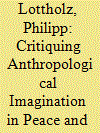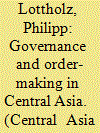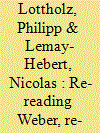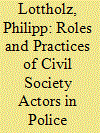|
|
|
Sort Order |
|
|
|
Items / Page
|
|
|
|
|
|
|
| Srl | Item |
| 1 |
ID:
161140


|
|
|
|
|
| Summary/Abstract |
This article seeks to show how the ethnographic peace research agenda can benefit from long-standing discussions in the anthropological literature. It sets out by arguing that the ‘anthropological imagination’ apparent in recent debates in peace and conflict studies is informed by an empiricist positivism that conceives of ethnography as a data-gathering tool. By drawing insights from the ‘writing culture’ and ‘Third World feminism’ debates, I will show how such empiricism was challenged and partly done away with in favour of new dialogical and collaborative approaches to knowledge production. In the second part, focussed on the context of the Kyrgyz Republic in Central Asia, I will illustrate the limits and blind spots of the prevalent empiricist approach to studying peace and conflict by showing how discourses and imaginaries of a ‘culture of peace’, tolerance and multiculturalism conceal forms of exclusion, marginalization and hidden conflict. I will show how my own collaborative research sheds light on community security practitioners’ efforts to understand and tackle security challenges. This practico-discursive analysis exemplifies how critical ethnographic peace research can help to uncover patterns of conflict management, post-conflict governmentality, and the construction and ‘othering’ of group identities.
|
|
|
|
|
|
|
|
|
|
|
|
|
|
|
|
| 2 |
ID:
173339


|
|
|
|
|
| Summary/Abstract |
This forum brings together five different angles on the question as to whether and how political regimes and forms of order-making can and should be researched through the concept of ‘illiberalism’. The discussion engages critically with this and associated concepts, such as ‘illiberal peace’ and ‘authoritarian conflict management’, which have been developed out of the Central Asian / Eurasian context and discussed in their wider global ramifications and, within the framing of ‘illiberal peace’, explored in various contexts in and beyond Central Asia. While further assessing the relevance and implications of this approach, this forum also attempts to think beyond ‘illiberalism’ by introducing and discussing the idea of ‘post-liberalism’. This way, the authors engage in an exchange that serves to probe both concepts and to determine their strengths and limitations when it comes to analysing and understanding politics and societal processes in Central Asia.
|
|
|
|
|
|
|
|
|
|
|
|
|
|
|
|
| 3 |
ID:
183972


|
|
|
|
|
| Summary/Abstract |
In this essay, we build on earlier discussions on the insufficiency of labels such as ‘post-Soviet’ and ‘postcolonial’ for Central Asian regimes and propose a consideration of their particular post-imperial character. We illustrate the usefulness of this lens through an analysis of security and violent conflicts in Central Asia and how governments interpret and present these conflicts. Our discussion draws systematically on existing research on relevant processes in Kazakhstan, Kyrgyzstan, Uzbekistan and Tajikistan, allowing us to identify key themes of a post-imperial politics of security and their implications in a comparative perspective.
|
|
|
|
|
|
|
|
|
|
|
|
|
|
|
|
| 4 |
ID:
153894


|
|
|
|
|
| Summary/Abstract |
This article analyzes how different interpretations of Max Weber’s work on the state and legitimacy have materialized in contemporary research on—and practice of—international state-building. We argue that the currently prevailing neo-Weberian institutionalism in state-building theory and practice is based on a selective interpretation of the passionate and polemicist ‘politician’ Max Weber, whilst omitting almost entirely the wealth of thought on interpretivist method and the anti-foundationalist approach to social sciences that he has developed in his scholarly work. The neo-Weberian institutionalist approach thus focuses almost exclusively on state capacity and institutions. In contrast to this restricted approach, we will show how Weber’s work on the historical and cultural dimensions of legitimacy is instructive in understanding the emergence and consolidation of social orders. Research agendas embracing such perspectives offer a viable way forward from the securitized approach to state-building and international intervention, in the process moving beyond the neo-Weberian orthodoxy.
|
|
|
|
|
|
|
|
|
|
|
|
|
|
|
|
| 5 |
ID:
177848


|
|
|
|
|
| Summary/Abstract |
The increasingly complex and differentiated field of security sector and police reform has given rise to extensive research into such processes, but also the stalemate and contradictions they are facing. Recent analyses have shown how civil society actors can successfully influence reform and hold authorities accountable, but are also facing limits in terms of their own expertise, capacity and representativeness. This article presents new evidence of interactions between civil society, state authorities and international organizations on the basis of participatory fieldwork and public discourse analysis in the Kyrgyz Republic in Central Asia. Taking particular interest in practices, expertise and knowledge production, I show how the organization in focus, an NGO network promoting alternative approaches to police reform, had to live up to different roles in trying to effect change: that of activists who mobilize popular support; of experts who apply novel, participatory community security approaches in piloting communities; and lastly, that of knowledge producers providing evidence of the need for reform. These roles and practices, and their implications for the network’s reform impact are critically assessed and, in conclusion, developed into the need for future research.
|
|
|
|
|
|
|
|
|
|
|
|
|
|
|
|
| 6 |
ID:
183966


|
|
|
|
|
| Summary/Abstract |
The difficulty of building long-lasting peace and comprehensive security in societies emerging from conflict and external rule seems to be particularly pronounced in the peripheries of the former Soviet Union and its sphere of influence. The limited success and failures of long-standing efforts to build up and shape state structures and institutions that guarantee democratic, peaceful and secure development have led to increased questioning of the assumptions of liberal and institutionalist approaches that have long dominated scientific and policy debates. Given the sustained and increasingly sophisticated ways in which regional regimes shape and restrict possibilities for cooperation and interaction, and, more significantly, the livelihoods of their populations, there appears to be ample room for further discussion of new ways of grasping current political and societal developments in Central Asia against their historical background.
|
|
|
|
|
|
|
|
|
|
|
|
|
|
|
|
|
|
|
|
|